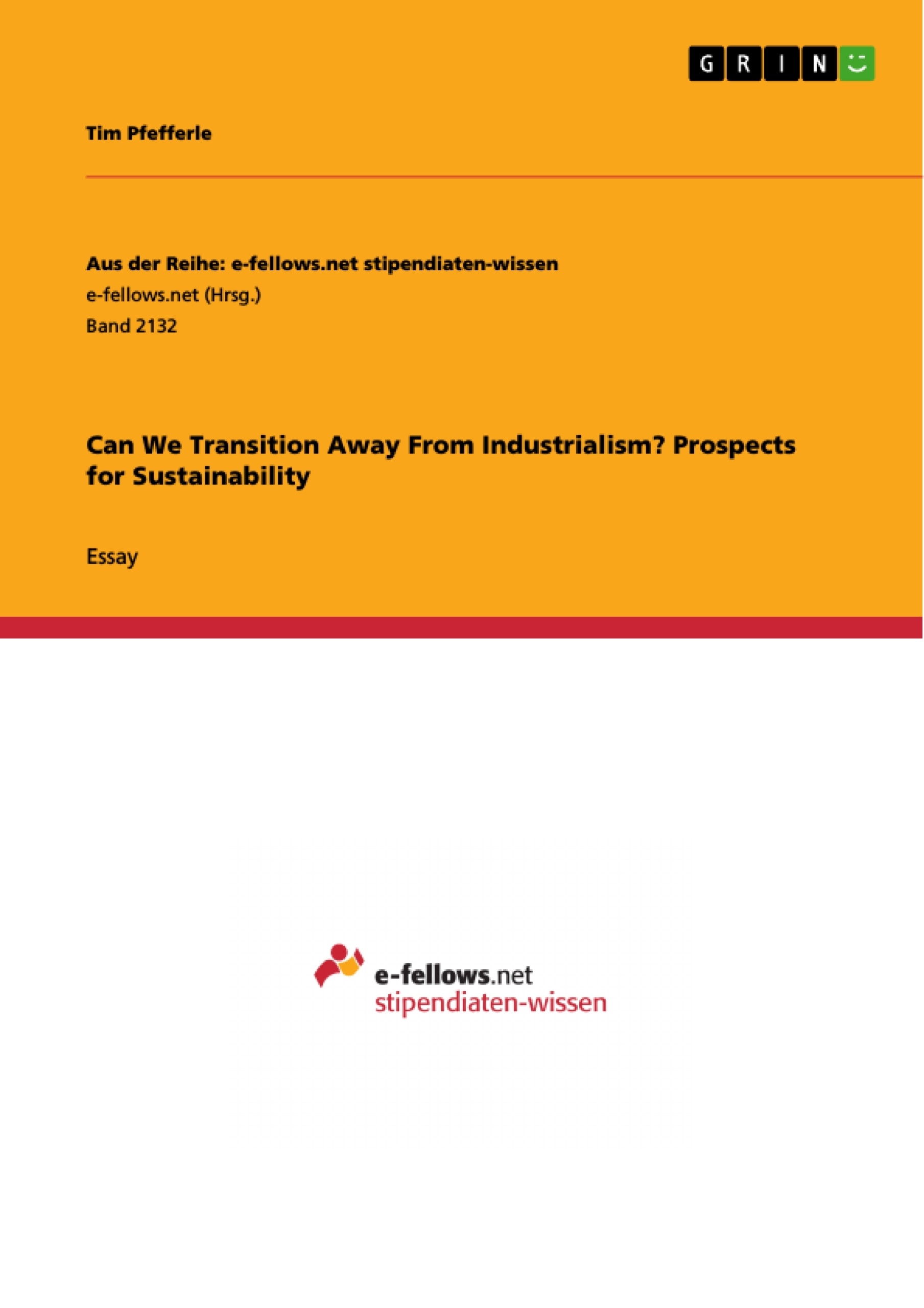This essay will argue that, in principle, there are two alternative pathways towards a transition away from industrialism. The first is based on a green growth paradigm, which is premised on the notion of a decoupling of growth from resource consumption. The second pathway does away with growth as the underlying driver of the world economy, putting in place deep cuts in resource consumption. Both pathways are faced with considerable challenges in economic, social, political and environmental terms.
Inhaltsverzeichnis (Table of Contents)
- Introduction
- Sustainability Defined
- The Green Growth Pathway
- The No-Growth Scenario
- A Different Transition
Zielsetzung und Themenschwerpunkte (Objectives and Key Themes)
This essay examines the prospects for a successful sustainability transition away from industrialism. It explores two alternative pathways: the green growth paradigm and the no-growth scenario. The essay analyzes the challenges and potential benefits of each approach, considering economic, social, political, and environmental implications.
- The sustainability of current consumption patterns
- The role of technological innovation and resource consumption
- The feasibility of economic growth in a sustainable future
- The need for political and social transformations
- The importance of new sustainability indicators
Zusammenfassung der Kapitel (Chapter Summaries)
- Introduction: The essay introduces the concept of a sustainability transition away from industrialism, highlighting the unsustainable nature of current consumption patterns and the need for alternative pathways.
- Sustainability Defined: This section provides a definition of sustainability, emphasizing the three pillars of social, economic, and environmental aspects.
- The Green Growth Pathway: This chapter explores the green growth paradigm, focusing on decoupling economic growth from resource consumption through technological innovation, policy changes, and consumer behavior adjustments.
- The No-Growth Scenario: This section delves into the no-growth scenario, arguing for deep cuts in consumption and a restructuring of the economic system to achieve sustainability.
- A Different Transition: This chapter discusses the key differences between the transition towards sustainability and previous economic transformations, highlighting the need for contraction rather than expansion.
Schlüsselwörter (Keywords)
The key themes and concepts explored in this essay include sustainability transition, industrialism, green growth, no-growth scenario, resource consumption, technological innovation, economic growth, social and political transformations, sustainability indicators, planetary boundaries, and consumption contraction.
Frequently Asked Questions
What are the two pathways away from industrialism?
The essay identifies the 'green growth' paradigm (decoupling growth from resource use) and the 'no-growth' scenario (deep cuts in consumption and restructuring the economy).
What is the "decoupling" concept in green growth?
Decoupling refers to the idea that an economy can continue to grow financially while its environmental impact and resource consumption decrease through technological innovation.
What challenges does the no-growth scenario face?
This scenario faces massive political and social resistance, as it requires a fundamental shift away from current economic drivers and significant lifestyle changes in developed nations.
Why are current consumption patterns considered unsustainable?
Current industrial patterns exceed planetary boundaries, leading to resource depletion and environmental degradation that cannot be maintained in the long term.
How does this transition differ from previous economic shifts?
Unlike previous transitions that focused on expansion, a sustainability transition may require 'contraction'—a reduction in the overall material throughput of the global economy.
- Quote paper
- Tim Pfefferle (Author), 2016, Can We Transition Away From Industrialism? Prospects for Sustainability, Munich, GRIN Verlag, https://www.grin.com/document/341386



